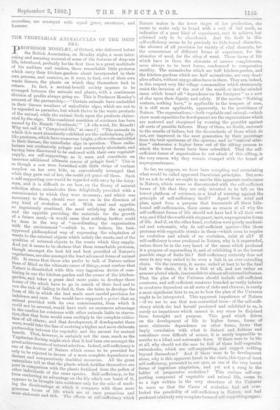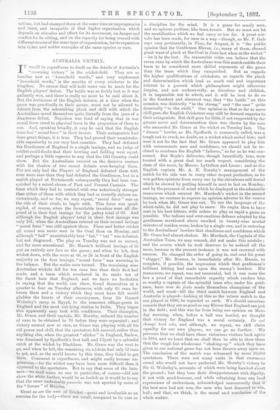THE VEGETARIAN ANIMALCULES OF THE DEEP SEA.
PROFESSOR MOSELEY, of Oxford, who delivered before the British Association, on Monday night, a most inter- esting and amusing account of some of the features of deep-sea life, introduced, probably for the first time to a great multitude of his auditors and readers, those remarkable little protozoa which carry their kitchen-gardens about incorporated in their own persons, and contrive, as it were, to feed, out of their own waste tissues, the plants on which they themselves feed in return. In fact, a mutual-benefit society appears to be arranged between the animals and plants, with a continuous division of profits always going ou. This is Professor Moseley's account of the partnership:—" Certain animals have embedded in their tissues numbers of unicellular alga:, which are not to
be regarded as parasites, but which thrive in the waste products of the animal, while the animal feeds upon the products elabor- ated by the algae. This combined condition of existence has been named by Dr. Brandt Symbiosis.'" [A vile word, Dr. Brandt ! Why not call it " Compound-life," at once ?] "The animals in
which it is most abundantly exhibited are the radiolarians, jelly- like protozoa, which have numerous bright, yellow cells embedded in their tissues, the unicellular algtu in question. These radio- larians are exclusively pelagic and enormously abundant, and having been discovered to be endowed with their own vegetable supply, are self-supporting, as it were, and constitute an immense additional ultimate source of pelagic food." This is as though a cow were furnished with little strips of verdant meadow on her own hide, so conveniently arranged that while they grew out of her, she could yet graze off them. Such a self-supporting cow would be regarded with envy by the dairy- man, and it is difficult to see how, on the theory of natural selection alone, animalcules thus delightfully provided with a commissariat to which they were necessary, and which was necessary to them, should ever move on in the direction of any kind of evolution at all. With meal and appetite so ingeniously combined, the meal satisfying the appetite,. and the appetite providing the materials for the growth of a future meal,--it would seem that nothing further could be done in the way of "co-ordinating the organisation with the environment "—which is, we believe, the best- approved philosophical way of expressing the adaptation of wants to the external objects which satisfy the wants, and of the qualities of external objects to the wants which they supply. And yet it seems to be obvious that these remarkable protozoa, though amongst the best fed and best provided of Nature's vegetarians, aro also amongst the least advanced forms of animal life. It seems that those who prefer to talk of Nature rather than of Mind as the ultimate cause of things, must confess that Mature is dissatisfied with this very ingenious device of com- bining iu one the kitchen-garden and the owner of the kitchen- garden, and takes a great deal more pains to develope those forms of life which have to go in search of their food and to run the risk of failing to find it, than she takes to develope the form of life iu which she had made most careful provision for indolence and ease. One would have supposed a priori that an animal provided with its own commissariat, from which it could not be severed, would have such an enormous advantage in the conflict for existence with other animals liable to starva- tion,that that form would soon multiply to the complete extinc- tion of all others ; and that development, if developmdnt there were, would take the line of evolving a higher and more elaborate partnership between the vegetable and the animal for mutual benefit. That, however, is certainly not the case, much as the Vegetarian Society might wish that it had been one amongst the great achievements of natural selection. Indeed, self-sufficiency is one of the devices of Nature which seems to be provided for only to be rejected in favour of a more complete dependence on distant and comparatively doubtful resources. All the great naturalists tell us that the plants which fertilise themselves are poor 0_0e r in comparison with the plants fertilised from the pollen of other individuals of the same species. Self-sufficiency, so far from conferring an advantage on the life which can boast of it,
appears to be brought into existence only for the sake of mark- ing the disadvantage at which it compares with those more generous forms of life which are at once precarious and more elaborate and rich. The efforts at self-sufficiency which Nature makes in the lower stages of her production, she seems to make only to brand with a sort of bad mark, as indicative of a poor kind of experiment, easy to achieve, but achieved only to be abandoned. And the fault in this self-sufficiency seems to be precisely its hide-bound character, the absence of all provision for variety of vital elements, for the concurrence of different forms of experience, for the stimulus of need, for the sting of want. Those forms of life which have in them the elements . of narrow completeness, seem always to be inert forms, condemned to comparative sterility. The animalcules which are half kitchen-garden, and the kitchen-gardens which are half animalcules, are very dead- alive affairs, without any go-aheadness in them. They are, indeed, in this respect very like village communities which strenuously resist the invasion of the rest of the world, or insular-minded races which brand all " dependence on the foreigner " as a sort of slur upon their dignity and safety. If the maxim "Nothing venture, nothing have," is applicable to the tempers of men, it is still more applicable, apparently, to the providence of Nature. The orgauisations,—both vegetable and animal,—which show most capacities for development are the organisations which are matured and shartioned by running the gauntlet against all sorts of possible failures. Many of them, no doubt, succumb to the results of failure, but the descendants of those which do not, are improved in the next generation by their parentage from the best specimens of the species ; and so "natural selec- tion" elaborates a higher form out of the sifting process to which the lower forms have been submitted. That the self- sufficient forms of organisation do not admit of this sifting, is the very reason why they remain stamped with the brand of unprogressiveness.
So far, we suppose, we have been accepting and enunciating what would be called approved Darwinian principles. But now, let us ask to what we ought to ascribe this apparent.restlessness in Nature, which seems so discontented with the self-sufficient forms of life that they are only .invented to be left on the lowest platform of existence, as a kind of warning against the principle of self-sufficiency itself P Apart from mind and plan, apart from a purpose that transcends all these hide- bound self-sufficiencies, there seems no reason at all why the self-sufficient forms of life should not have had it all their own way, and filled the world with stagnant, inert, unprogressive forms of life. And if, on the other hand, evolution were purely mechani- cal and automatic, why do self-sufficient species—like those protozoa with vegetable streaks in them—which seem to require no evolution and admit of no evolution, exist at all P If self-sufficiency is once produced in Nature, why is it superseded, unless there be in the very heart of the cause which produced it a purpose of superseding it and of exhibiting it as the lowest possible stage of finite life P Self-sufficiency certainly does not seem in any way suited to be oven a link in au ever-extending chain. On the contrary, it seems suited at best to be the final link in the chain, if it b'e a link at all, and not rather an armour-plated whole, inaccessible to almost all external influence. That the plan of the Universe should include self-sufficient creatures, and self-sufficient creatures branded as vastly inferior to creatures dependent on all sorts of risks and chances, is surely a most significant hint to us, as to how the plan of the Universe ought to be interpreted. This apparent impatience of Nature —if we are to use that non-committal term—of the self-suffi- cioncy which she had herself produced and exhibited. to us, is surely an impatience which cannot in any sense be disjoined from foresight and purpose. This goad which drives on the development of life to higher forms, forms of more elaborate dependence ou other forms, forms that imply correlation with what is distant and dubious and sometimes even difficult of access, it is surely impossible to ascribe to a blind and automatic force. If there were to be life at all, why should not the seas be full of these half-vegetable animalcules, which are self-supporting, and suggest nothing beyond themselves ? And if there wore to be development alone, why is this apparent break in the chain,this type of inert self sufficiency, presented to our eyes, as one of the very lowest forms of ingenious adaptation, and yet not a rung in the ladder of progressive evolution P This curious self-sup- porting compound of vegetable and 'animal life, seems to us a sign written in the very structure of the Universe to warn us that the Cause of evolution had not over- looked the possibility of self-sufficiency in Nature, and had produced relatively very complete forms of self- supporting organi-
cations, but had stamped them at the same time as unprogressive and inert, and incapable of that higher organisation which depends on stimulus and effort for its movement, on danger and conflict for its sifting, and on the capacity for being crossed with different strains of the same type of organisation, for its expansion into richer and nobler examples of the same species or raoe.































 Previous page
Previous page